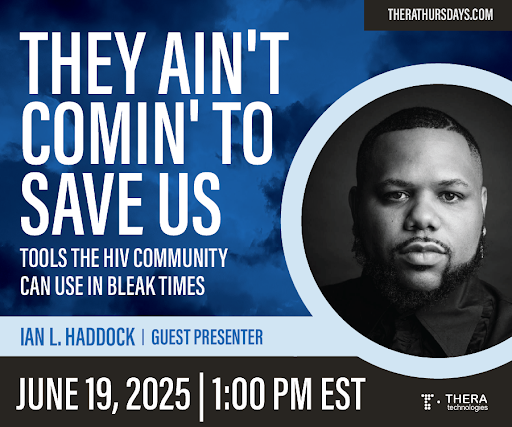
By Quintay Knight, Communities of Color & Media Consultant
On June 19th 2025 THERA Thursdays hosted a webinar entitled “They Ain’t Coming To Save US” featuring guest presenter Ian L. Haddock– speaker, writer, author, advocate and the host Mable Taplin – global patient advocate, strategic leader, author and keynote speaker. The webinar explores discussions emphasizing the need for collaboration, reducing overhead, and social entrepreneurship. While spotlighting Audre Lorde (1934-1992) a well-known lesbian, poet, writer, and co-founder of Sisterhood In Support of Sisters in South Africa, the segment also honored Essex Hemphill (1957-1995), a Black HIV positive gay poet who passed away on November 4, 1995. His poem ” For My Own Protection” explores homophobia, racism, violence, and dehumanization during the AIDS crisis all while emphasizing the need for collective action and the power of words to heal and inspire future generations. The segment also recognized Lucy Hicks Anderson (1886-1954) a transgender woman who was prosecuted for perjury in 1945 for living as her true self. Anderson’s life story highlights the ongoing challenges and resilience of transgender individuals then and now.
Throughout the webinar, Ian also emphasizes the importance of ancestral connections and the power of perseverance against all odds. He introduces Cocoa360, an organization located in Ghana, that leverages cocoa farming revenues to improve education and health outcomes. Cocoa 360’s model is used as an example of social entrepreneurship and community-driven development. The discussion includes the importance of teaching people how to be self-sufficient and the potential for community-led initiatives to fund programs. Ian shares the success of his own homegrown intervention and the potential for similar models to support communities impacted by HIV.
Ultimately, Ian emphasizes the need for community members to take action and use their gifts to make a difference. A major theme of the webinar was the importance of self-reliance and the understanding that no one is coming to save us. Especially in today’s political climate—where funding for vital programs is under threat—the message was clear: we have to save ourselves.
If you missed the webinar and would like to catch up on the conversation Click Here












